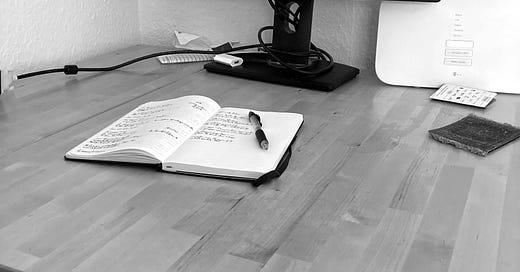#4 Brandon Kilbourne, poet
'There is something about being in a new city that I find stimulating for writing'
Originally from Lafayette, Louisiana (USA), Brandon Kilbourne is a poet and biologist living in Berlin, Germany. The beginnings of his poems occur not only among the bones and muscles he studies but also among the people encountered and human connections made during his travels. On top of this, Kilbourne uses fieldwork as a motivation to learn about poets and poetry from the countries that he visits. Since 2018, Kilbourne has had poetry appear in Sky Island Journal, Catamaran Literary Reader, Ecotone, and more. His poetry can be found here.
Where do you write?
In the Great Before (that is to say, before the pandemic), I would write pretty much anywhere – at home, at a bar, or at a café. Since the pandemic, I am doing most of my writing at home. However, I also enjoy writing when I am traveling. There is something about being in a new city that I find stimulating for writing. I should also say that I sometimes compose poems in my head when I am walking to and fro in Berlin, and I always try to have my notebook on me to jot down lines on the fly.
Morning writer or late-night words?
Late night, absolutely. On a weekend, I can easily be up to 03:00 if not sometimes to 05:00. I usually try to end my weekdays with an hour (well, if I’m going to be honest, often more than an hour) of writing. Usually one day of the weekend, I try to spend the bulk of the day writing.
Coffee, tea or any other drinks?
For the most part, water, especially on weekdays. On weekend nights, sometimes a beer, sometimes bourbon-cola, but most often a cola. If I’m writing in a café or restaurant, then usually sparkling water or beer.
Handwritten notes or phone files?
Handwritten notes, definitely. I only take notes on my phone if I’m somewhere that’s really inconvenient to have my notebook out, like when salsa dancing.
Something to nibble while you write?
When I’m at home, I’m not a huge snack person. However, when I write in a café, I might order something small, like a cookie or a brownie. If I’m traveling alone and eating in a restaurant, I’ll have my notebook out during the entire meal and write.
Any desk essentials?
I’m very particular about the kind of pen and notebook that I write with. Nothing fancy like a fountain pen, but I’ll keep the brands to myself.
What's on the speakers?
I tend these days to listen to a lot of indie when I write, so some artists on heavy rotation include Sharon Van Etten and Emma Ruth Rundle. I also listen to hip-hop, in the vein of Yasiin Bey/Mos Def, Talib Kweli, Kendrick Lamar, and MF DOOM, among others. Also, I’d say John Coltrane strikes a creative nerve within me.
Perfect bookshop to hide on a rainy day?
St George’s in P-Berg, and Odradek in S-Berg [both in Berlin]. Odradek is much closer to home; though it’s small, I can pass some time talking to the friendly employees. Non-Berlin bookshops that I like include Open Books in Seattle, Strand in NYC, and Hatchard’s in London. I hope to one day visit Powell’s in Portland.
The best word in the English language?
Really I have to choose just one? Okay. “Petrichor.” No wait, “susurrous.” Actually, “eldritch”….
A poem that has changed your life:
I would say Whitman’s “Song of Myself” if I really had to choose one poem, because I think this really inspired me to get serious about writing my own poems. Or maybe Clifton’s “why people be mad at me sometimes,” because this sparse and succinct poem intimately resonates with multiple aspects of my life, and I know it will (unfortunately) continue to do so.
However, there are several poems that have an indelible resonance with me, including Brown’s “Harlem Happiness,” Frost’s “Acquainted with the Night,” Symborska’s “Some People,” Drummond de Andrade’s “An Ox Looks at a Man,” Whitman’s “When I heard the Learn’d Astronomer,” Hayden’s “Middle Passage,” Lourde’s “Who Said It Was Simple,” Brooks’s “A Bronzeville Mother Loiters in Mississippi. Meanwhile, a Mississippi Mother Burns her Bacon,” Boland’s “After a Childhood Away from Ireland,” Alver’s “Machine,” Merwin’s “For a Coming Extinction,” and Hopkin’s “God’s Grandeur.” And maybe as a real oddball that I will always find fascinating, Akhmatova’s “Poem Without a Hero.”
Two books that really changed how I see poetry would be Edward Hirsch’s Poet’s Choice and Robert Pinsky’s The Sounds of Poetry. The first book demonstrated to me that poetry itself is a kind of living dialogue that traverses cultures, geography, politics, nationalities, and centuries. The second book strongly influenced how I think about sound and rhythm when I’m writing a poem.
I tried my best to link all of Brandon's mentioned poems here. If you find them, please add the link in the comments and I'll update the article!





